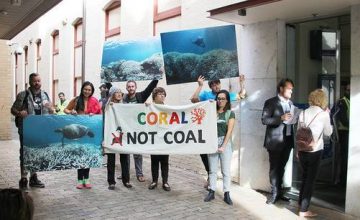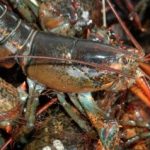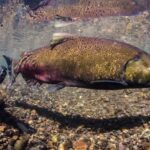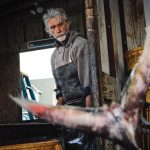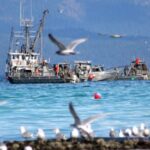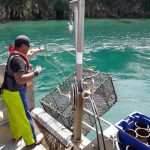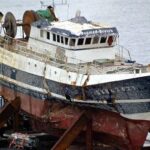Monthly Archives: June 2016
‘Wicked Tuna’ captains captivate, spur laughs, dollars for Friends of Rollo charity event in San Diego
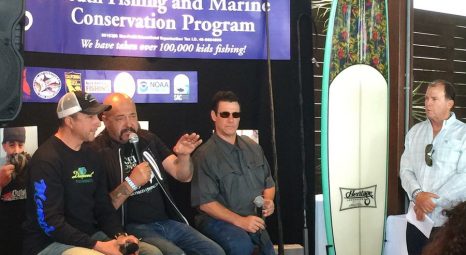 The first thing you notice when boat captains Dave Carraro, Dave Marciano and Paul Hebert of the popular TV show “Wicked Tuna” hang out: They actually might … gasp … like each other. When the captains sat down for a kickoff event Monday at Bali Hai on Shelter Island for “Tuna Wars II,” though, the good-natured jabs and laughs flow. Carraro, the most consistently successful captain on the show, faux-gloated about his well-appointed boat, FV-Tuna.com. Heber, who guides the underdog Wicked Pissah, pounced: “You don’t like saltwater in the hot tub. That’s a buzzkill.” The response from Carraro: “Paul’s a couple french fries short of a Happy Meal.” The tuna hunters climbed onto local boats Wednesday and Thursday to explore waters on the opposite coast, while raising gobs of cash for Friends of Rollo — the group that helps children embark on saltwater fishing trips. Read the story here 12:26
The first thing you notice when boat captains Dave Carraro, Dave Marciano and Paul Hebert of the popular TV show “Wicked Tuna” hang out: They actually might … gasp … like each other. When the captains sat down for a kickoff event Monday at Bali Hai on Shelter Island for “Tuna Wars II,” though, the good-natured jabs and laughs flow. Carraro, the most consistently successful captain on the show, faux-gloated about his well-appointed boat, FV-Tuna.com. Heber, who guides the underdog Wicked Pissah, pounced: “You don’t like saltwater in the hot tub. That’s a buzzkill.” The response from Carraro: “Paul’s a couple french fries short of a Happy Meal.” The tuna hunters climbed onto local boats Wednesday and Thursday to explore waters on the opposite coast, while raising gobs of cash for Friends of Rollo — the group that helps children embark on saltwater fishing trips. Read the story here 12:26
China rock lobster deal under fire – gives a foreign entity control of a highly valuable WA commodity
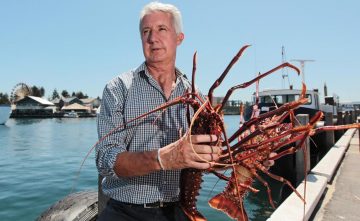 A veteran of WA’s rock lobster industry has hit out at a deal that allowed a Chinese conglomerate to buy local fishing rights. Peter Prideaux said the deal between Kailis Bros and Legend Holdings to create KB Foods set an alarming precedent for foreign ownership in the fishery. “The Western Rock Lobster Fishery is one of the most valuable fisheries in the world,” he said. “Competition for control, primarily by processors, and an ever smaller band of surviving fishers has driven access costs through the roof. “Pot prices and leasing costs have increased six-fold in about five years. This is not an industry suffering from lack of investment capital, in fact, quite to the contrary.” Mr Prideaux said the Legend deal effectively gave a foreign entity control of a highly valuable WA commodity. Read the rest here 11:26
A veteran of WA’s rock lobster industry has hit out at a deal that allowed a Chinese conglomerate to buy local fishing rights. Peter Prideaux said the deal between Kailis Bros and Legend Holdings to create KB Foods set an alarming precedent for foreign ownership in the fishery. “The Western Rock Lobster Fishery is one of the most valuable fisheries in the world,” he said. “Competition for control, primarily by processors, and an ever smaller band of surviving fishers has driven access costs through the roof. “Pot prices and leasing costs have increased six-fold in about five years. This is not an industry suffering from lack of investment capital, in fact, quite to the contrary.” Mr Prideaux said the Legend deal effectively gave a foreign entity control of a highly valuable WA commodity. Read the rest here 11:26
U.S. Rep. Walter Jones and other congressmen want South Atlantic red snapper fishery reopened
 The representatives said data produced by a Florida research institution shows the South Atlantic red snapper stock is healthier than what federal data indicates so the fishery should be reopened to commercial and recreational fishing. The South Atlantic Fishery Management Council, a division of the National Oceanic and Atmospheric Administration Fisheries program, announced the South Atlantic red snapper season is closed this year because the total number of red snapper removed from the population in 2015 exceeded the allowable level, according to the NOAA Fisheries website. The Florida Fish and Wildlife Research Institute, a subsidiary of the Florida Fish and Wildlife Commission, has data that shows the red snapper stock is healthier than the federal data indicates. “Unfortunately, reports indicate these data are not being considered as ‘best available science’ and, therefore, are at risk of being excluded from the (South Atlantic Fishery Management) Council’s deliberations,” Jones and his colleagues said in a letter to NOAA Administrator Kathryn Sullivan. Read the rest here 09:26
The representatives said data produced by a Florida research institution shows the South Atlantic red snapper stock is healthier than what federal data indicates so the fishery should be reopened to commercial and recreational fishing. The South Atlantic Fishery Management Council, a division of the National Oceanic and Atmospheric Administration Fisheries program, announced the South Atlantic red snapper season is closed this year because the total number of red snapper removed from the population in 2015 exceeded the allowable level, according to the NOAA Fisheries website. The Florida Fish and Wildlife Research Institute, a subsidiary of the Florida Fish and Wildlife Commission, has data that shows the red snapper stock is healthier than the federal data indicates. “Unfortunately, reports indicate these data are not being considered as ‘best available science’ and, therefore, are at risk of being excluded from the (South Atlantic Fishery Management) Council’s deliberations,” Jones and his colleagues said in a letter to NOAA Administrator Kathryn Sullivan. Read the rest here 09:26
East Coast Fishermen voice objections over plan for wind farm off New York coast
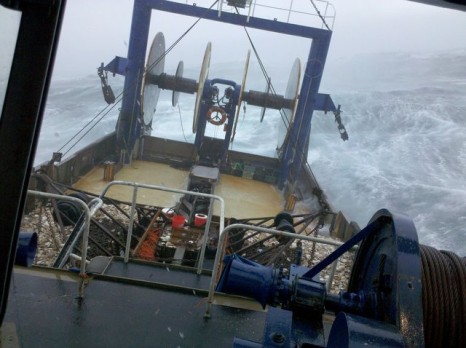 A long-stalled plan to build a forest of power-producing windmills off the coast of New York may finally be gathering momentum, and that is sparking concern among commercial fishermen who fear the giant turbines will ruin an area rich with scallops and other sea life. Federal officials announced earlier this month that they would auction off the rights to build the wind power farm on a 127-square-mile wedge of the Atlantic Ocean. The tip of the wedge begins about 11 miles south of Long Island’s popular Jones Beach and spreads out across an area, sandwiched between major shipping lanes, where trawlers harvest at least $3.3 million worth of sea scallops each year, as well as smaller amounts of mackerel, squid and other species, according to a study commissioned by the Bureau of Ocean Energy Management. “There’s got to be a better place,” said Eric Hansen, a scallop fisherman based in New Bedford, Massachusetts. Read the rest here 08:39
A long-stalled plan to build a forest of power-producing windmills off the coast of New York may finally be gathering momentum, and that is sparking concern among commercial fishermen who fear the giant turbines will ruin an area rich with scallops and other sea life. Federal officials announced earlier this month that they would auction off the rights to build the wind power farm on a 127-square-mile wedge of the Atlantic Ocean. The tip of the wedge begins about 11 miles south of Long Island’s popular Jones Beach and spreads out across an area, sandwiched between major shipping lanes, where trawlers harvest at least $3.3 million worth of sea scallops each year, as well as smaller amounts of mackerel, squid and other species, according to a study commissioned by the Bureau of Ocean Energy Management. “There’s got to be a better place,” said Eric Hansen, a scallop fisherman based in New Bedford, Massachusetts. Read the rest here 08:39
Jerry Schill, NCFA responds to outdoor columnist Ed Wall
 In response to Ed Wall’s Outdoors column, “Fisheries should be managed for all, by all,” I offer the following comments. Mr. Wall mischaracterized my position on the referendum when he wrote that “Jerry Schill…is particularly disturbed by the fact that HB 1122 would allow a referendum on the issue by the state’s voters in the upcoming election in November. He is apparently concerned about citizens all across the state would be allowed to voice their opinions about something that he feels should be controlled solely by persons — and their representatives — in the coastal counties.” I never said such a thing. I do not favor an illegal action, and that is what it would be if the bill in question was passed as Rep. Billy Richardson suggests. On the subject of the net ban: Read the rebuttal here 22:38
In response to Ed Wall’s Outdoors column, “Fisheries should be managed for all, by all,” I offer the following comments. Mr. Wall mischaracterized my position on the referendum when he wrote that “Jerry Schill…is particularly disturbed by the fact that HB 1122 would allow a referendum on the issue by the state’s voters in the upcoming election in November. He is apparently concerned about citizens all across the state would be allowed to voice their opinions about something that he feels should be controlled solely by persons — and their representatives — in the coastal counties.” I never said such a thing. I do not favor an illegal action, and that is what it would be if the bill in question was passed as Rep. Billy Richardson suggests. On the subject of the net ban: Read the rebuttal here 22:38
Federal ocean planning effort met with skepticism in New Bedford
 No commercial fishermen attended a Wednesday meeting about a new ocean planning initiative, and a local port leader warned that mistrust of the government — widespread on the waterfront — could be spurring skepticism about the federal effort to gather and utilize public input. State and federal officials including Betsy Nicholson of the National Oceanic and Atmospheric Administration (NOAA) led the event, which drew about 20 people to a third-floor room in New Bedford’s downtown library. The intent was to hear public comment on the draft Northeast Regional Ocean Plan. The plan culminates a four-year effort to compile input from numerous marine industries, environmental groups, public and private officials, tribal entities and others, across all six New England states, for a document that could guide future ocean planning. Read the rest here 18:19
No commercial fishermen attended a Wednesday meeting about a new ocean planning initiative, and a local port leader warned that mistrust of the government — widespread on the waterfront — could be spurring skepticism about the federal effort to gather and utilize public input. State and federal officials including Betsy Nicholson of the National Oceanic and Atmospheric Administration (NOAA) led the event, which drew about 20 people to a third-floor room in New Bedford’s downtown library. The intent was to hear public comment on the draft Northeast Regional Ocean Plan. The plan culminates a four-year effort to compile input from numerous marine industries, environmental groups, public and private officials, tribal entities and others, across all six New England states, for a document that could guide future ocean planning. Read the rest here 18:19
Shrimp became the top value catch for the state’s fishermen – North Carolina shrimp was a big deal
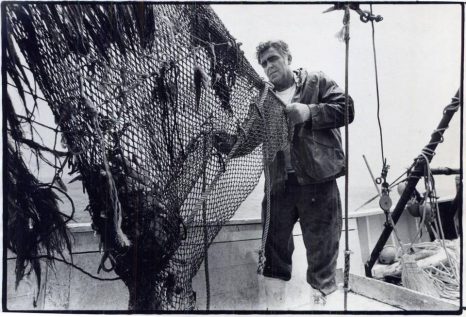 The life of commercial shrimpers can be unpredictable, as supply and the market vary. In 1953, writer Wade Lucas presented an optimistic view of the industry from Morehead City. Rested, ready and eager to get going after what some people down this way refer to as “white gold,” owners and operators of a large fleet of boats will be shoving off from various coastal points … in search of the wily shrimp that are now beginning to move in commercial quantities in State-controlled waters. By 1966, North Carolina shrimp was big business, as detailed by writer Frank Montgomery Jr. It takes an awful lot of shrimp to make all those shrimp cocktails Tar Heels eat in a year’s time. And to see that everybody in the Old North State gets enough of them, big and little shrimp boats, with some sort of trawl hung astern, pursue their quarry all through the year with zeal and gusto. From Pamlico Sound clear down to the South Carolina line, both inside and outside Carolina coastal waters get a regular and thorough going-over by the State’s shrimpers as they seek to supply a demand that never seems to slacken. Interesting. Read the story here 14:58
The life of commercial shrimpers can be unpredictable, as supply and the market vary. In 1953, writer Wade Lucas presented an optimistic view of the industry from Morehead City. Rested, ready and eager to get going after what some people down this way refer to as “white gold,” owners and operators of a large fleet of boats will be shoving off from various coastal points … in search of the wily shrimp that are now beginning to move in commercial quantities in State-controlled waters. By 1966, North Carolina shrimp was big business, as detailed by writer Frank Montgomery Jr. It takes an awful lot of shrimp to make all those shrimp cocktails Tar Heels eat in a year’s time. And to see that everybody in the Old North State gets enough of them, big and little shrimp boats, with some sort of trawl hung astern, pursue their quarry all through the year with zeal and gusto. From Pamlico Sound clear down to the South Carolina line, both inside and outside Carolina coastal waters get a regular and thorough going-over by the State’s shrimpers as they seek to supply a demand that never seems to slacken. Interesting. Read the story here 14:58
Haines Alaska: Ready, set, fish! Commercial salmon season starts Sunday
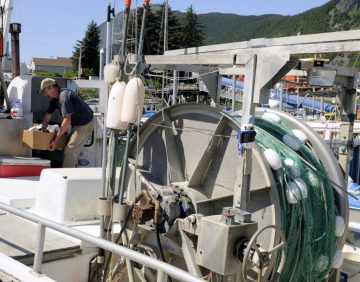 The gillnet fleet in Haines will rumble out of the harbor this weekend for the start of the 2016 commercial salmon fishing season. The first opener is 48 hours long, and starts at 12:01 p.m. on Sunday. Commercial fisherman Tim Hannon is optimistic. The salmon season starts on Sunday, and he says, with mediocre prices and small fish last year, he’s hearing good things about the season ahead. He’s captained the F/V Shotgun for seven years, but has been commercial fishing in Haines for 15, so he’s seen his share of good years and bad. As he loads up his provisions for the first opener, he says he’s heading out Saturday to try and beat the weather. Audio report, read the rest here 12:19
The gillnet fleet in Haines will rumble out of the harbor this weekend for the start of the 2016 commercial salmon fishing season. The first opener is 48 hours long, and starts at 12:01 p.m. on Sunday. Commercial fisherman Tim Hannon is optimistic. The salmon season starts on Sunday, and he says, with mediocre prices and small fish last year, he’s hearing good things about the season ahead. He’s captained the F/V Shotgun for seven years, but has been commercial fishing in Haines for 15, so he’s seen his share of good years and bad. As he loads up his provisions for the first opener, he says he’s heading out Saturday to try and beat the weather. Audio report, read the rest here 12:19
Hang on to those baseball caps and grab some ear protectors! Lobster boat racing season is here
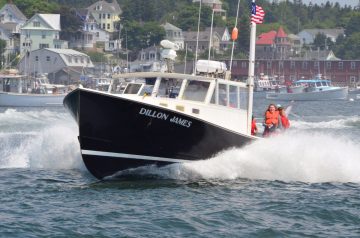 It’s the middle of June and the Maine lobster boat racing season is here. Last year saw some fierce competition despite the absence of two traditional, longtime racing venues. This year, Searsport and Harpswell are both still absent from the schedule, but there could be a potent new challenger for the World’s Fastest Lobster Boat title now held by Foolish Pleasure, and almost certainly, a Canadian invasion. This year’s schedule includes 10 events, with racing in ports all along the coast stretching from Portland to Jonesport. Nine of those events will count toward the Maine Lobster Boat Racing Association’s season-long points championship. The season opens this Saturday morning with the Boothbay Harbor Charlie Begin Memorial Lobster Boat Races. On Sunday, the fleet will head for Rockland to race behind the breakwater inside the harbor. Read the story here 11:15
It’s the middle of June and the Maine lobster boat racing season is here. Last year saw some fierce competition despite the absence of two traditional, longtime racing venues. This year, Searsport and Harpswell are both still absent from the schedule, but there could be a potent new challenger for the World’s Fastest Lobster Boat title now held by Foolish Pleasure, and almost certainly, a Canadian invasion. This year’s schedule includes 10 events, with racing in ports all along the coast stretching from Portland to Jonesport. Nine of those events will count toward the Maine Lobster Boat Racing Association’s season-long points championship. The season opens this Saturday morning with the Boothbay Harbor Charlie Begin Memorial Lobster Boat Races. On Sunday, the fleet will head for Rockland to race behind the breakwater inside the harbor. Read the story here 11:15
P.E.I. lobster processors work less as catches shrink
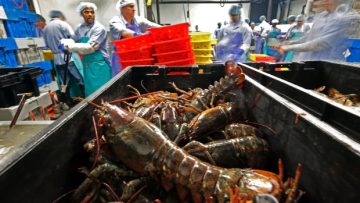 Unlike past seasons, when P.E.I. lobster processors have been scrambling for workers, this year they are working hard to give employees enough hours, as lower lobster landings mean fewer long days at processing plants. “In the past, when there would be a big hit of lobsters, there might by 75, 80-hour work weeks for people in the plants,” explained Dennis King, executive director of the P.E.I. Seafood Processors Association. “We’re not seeing much of that so far this spring, it’s mostly keeping around the 45 to 50-hour work week. I think a lot of employees in the seafood processing business would be used to more hours than that overall.” Read the story here 09:40
Unlike past seasons, when P.E.I. lobster processors have been scrambling for workers, this year they are working hard to give employees enough hours, as lower lobster landings mean fewer long days at processing plants. “In the past, when there would be a big hit of lobsters, there might by 75, 80-hour work weeks for people in the plants,” explained Dennis King, executive director of the P.E.I. Seafood Processors Association. “We’re not seeing much of that so far this spring, it’s mostly keeping around the 45 to 50-hour work week. I think a lot of employees in the seafood processing business would be used to more hours than that overall.” Read the story here 09:40
Obama’s moving closer to creating the world’s largest marine reserve — in Hawaii
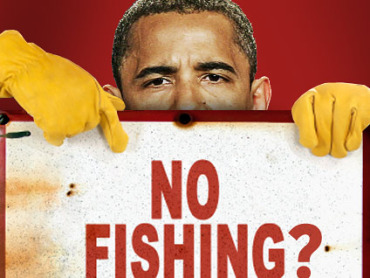 Obama may have chosen to locate his library in his adopted home state of Illinois, but a new move by Sen. Brian Schatz (D-Hawaii) suggests he may leave his biggest environmental footprint in his home state of Hawaii. Schatz sent a letter Thursday to the president asking him to consider expanding the Papahānaumokuākea Marine National Monument, which President George W. Bush created a decade ago, to more than four times its current size of 139,800 square miles. The senator, who has emerged as a key broker between Hawaiian fishing and other local interests and the federal government, has included a carve-out in his proposal so recreational and subsistence fishing operators from Kaua‘i and Ni‘ihau can continue to use certain areas that are outside the monument’s current boundaries. An active fishing spot around the National Oceanic and Atmospheric Administration’s weather buoy 51101 would remain open, though all the areas within the expanded monument would be closed to fishing or other forms of exploitation such as deep-sea mining. Read the rest here 08:05
Obama may have chosen to locate his library in his adopted home state of Illinois, but a new move by Sen. Brian Schatz (D-Hawaii) suggests he may leave his biggest environmental footprint in his home state of Hawaii. Schatz sent a letter Thursday to the president asking him to consider expanding the Papahānaumokuākea Marine National Monument, which President George W. Bush created a decade ago, to more than four times its current size of 139,800 square miles. The senator, who has emerged as a key broker between Hawaiian fishing and other local interests and the federal government, has included a carve-out in his proposal so recreational and subsistence fishing operators from Kaua‘i and Ni‘ihau can continue to use certain areas that are outside the monument’s current boundaries. An active fishing spot around the National Oceanic and Atmospheric Administration’s weather buoy 51101 would remain open, though all the areas within the expanded monument would be closed to fishing or other forms of exploitation such as deep-sea mining. Read the rest here 08:05
Many words created few changes to the Gulf of Alaska bycatch reduction package the North Pacific Fishery Management Council is pondering.
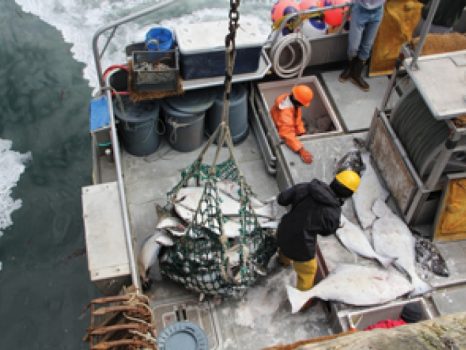 At its June meeting in Kodiak, the council held another session dedicated to the plan, which would enact one of several options aimed at reducing the amount of halibut and chinook salmon bycatch in the Gulf of Alaska groundfish fishery. The council moved three alternatives into a public scoping process but before making adjustments to alternatives, the overarching goals and objectives debate spurred a two-hour word battle among members that the chair found unproductive. Not only should the plan reduce bycatch, as the purpose and needs statement says, but should also “promote increased utilization of both target and secondary species while minimizing economic barriers for new participants and limiting harvest privileges.” The council lingo is meant to protect new entrant fishermen from consolidation and overwhelming entry costs to purchase fishing quota. (This is a long article with lots of info.) Read the story here 20:44
At its June meeting in Kodiak, the council held another session dedicated to the plan, which would enact one of several options aimed at reducing the amount of halibut and chinook salmon bycatch in the Gulf of Alaska groundfish fishery. The council moved three alternatives into a public scoping process but before making adjustments to alternatives, the overarching goals and objectives debate spurred a two-hour word battle among members that the chair found unproductive. Not only should the plan reduce bycatch, as the purpose and needs statement says, but should also “promote increased utilization of both target and secondary species while minimizing economic barriers for new participants and limiting harvest privileges.” The council lingo is meant to protect new entrant fishermen from consolidation and overwhelming entry costs to purchase fishing quota. (This is a long article with lots of info.) Read the story here 20:44
Coast Guard medevacs fisherman 60 miles east of Atlantic City, NJ
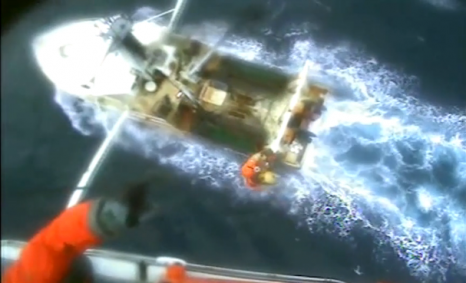 The Coast Guard medevaced a man Wednesday from a fishing vessel approximately 60 miles east of Atlantic City, New Jersey. Watchstanders at Coast Guard Sector Delaware Bay in Philadelphia received notification at about 5:20 p.m. from the crew aboard the fishing vessel Jeffrey Scott that a 57-year-old man was experiencing abdominal pain. Coast Guard Air Station Atlantic City launched an MH-65 Dolphin helicopter crew to assist. The man was hoisted at approximately 6:45 p.m. and transported to AtlantiCare Regional Medical Center in Atlantic City at 7:30 p.m. where he received further medical attention. “This was a challenging hoist due to the amount of rigging on the boat, but when we got on scene the crew was prepared and extremely helpful,” said Lt. Kyle Burke, a pilot on the case. “They maintained great communications with us through their VHF radio and everything went very smoothly. I’m so glad we were able to help this man get to the medical attention he needed.” Watch video, click here 18:13
The Coast Guard medevaced a man Wednesday from a fishing vessel approximately 60 miles east of Atlantic City, New Jersey. Watchstanders at Coast Guard Sector Delaware Bay in Philadelphia received notification at about 5:20 p.m. from the crew aboard the fishing vessel Jeffrey Scott that a 57-year-old man was experiencing abdominal pain. Coast Guard Air Station Atlantic City launched an MH-65 Dolphin helicopter crew to assist. The man was hoisted at approximately 6:45 p.m. and transported to AtlantiCare Regional Medical Center in Atlantic City at 7:30 p.m. where he received further medical attention. “This was a challenging hoist due to the amount of rigging on the boat, but when we got on scene the crew was prepared and extremely helpful,” said Lt. Kyle Burke, a pilot on the case. “They maintained great communications with us through their VHF radio and everything went very smoothly. I’m so glad we were able to help this man get to the medical attention he needed.” Watch video, click here 18:13
Sending “Chuck” home -15-pound lobster gets new lease on life
 He may have been too big for a pot anyway but a grocery store on Newfoundland’s west coast has spared the life of huge lobster that it says was a big draw for children in Corner Brook. Colemans says its O’Connell Drive store received the massive, 15-pound crustacean — nicknamed ‘Chuck” — in a shipment from a local seafood supplier. After weeks at the store, Colemans asked marine biologist Robert Hooper, of the Bonne Bay Marine Station in Norris Point, to have a look. He estimated Chuck is more than 50 years old. “Everyone agreed the best outcome for this lobster would be to release him back into the ocean,” said Colemans in a news release. So, on June 14, Mike Snooks, a Colemans seafood manager, carefully packed up the giant lobster for a car ride to the beach. After his claw bands were removed, Chuck disappeared into the depths of the Bay of Islands. Link 17:39
He may have been too big for a pot anyway but a grocery store on Newfoundland’s west coast has spared the life of huge lobster that it says was a big draw for children in Corner Brook. Colemans says its O’Connell Drive store received the massive, 15-pound crustacean — nicknamed ‘Chuck” — in a shipment from a local seafood supplier. After weeks at the store, Colemans asked marine biologist Robert Hooper, of the Bonne Bay Marine Station in Norris Point, to have a look. He estimated Chuck is more than 50 years old. “Everyone agreed the best outcome for this lobster would be to release him back into the ocean,” said Colemans in a news release. So, on June 14, Mike Snooks, a Colemans seafood manager, carefully packed up the giant lobster for a car ride to the beach. After his claw bands were removed, Chuck disappeared into the depths of the Bay of Islands. Link 17:39
Gulf Coast snook populations finally recover from devastating 2010 cold snap
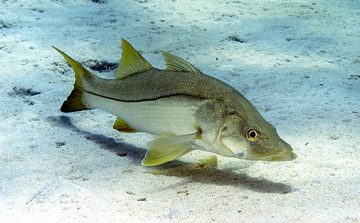 The number of snook along Florida’s Gulf Coast finally is where it was before a devastating freeze in January 2010 decimated the population, forcing the state to impose an unprecedented ban that hit hard the charter fishing and tourism industry from Tampa Bay south. Snook, widely considered Florida’s most popular nearshore game fish that drew sport fishermen from all over the world, are back in robust numbers along the state’s Gulf Coast, where the population took a big hit six years ago. The recovery was due to a concerted effort by state regulators, wildlife biologists, commercial, sport and charter fishermen who lost a lot of business during the ban. Read the story here 16:27
The number of snook along Florida’s Gulf Coast finally is where it was before a devastating freeze in January 2010 decimated the population, forcing the state to impose an unprecedented ban that hit hard the charter fishing and tourism industry from Tampa Bay south. Snook, widely considered Florida’s most popular nearshore game fish that drew sport fishermen from all over the world, are back in robust numbers along the state’s Gulf Coast, where the population took a big hit six years ago. The recovery was due to a concerted effort by state regulators, wildlife biologists, commercial, sport and charter fishermen who lost a lot of business during the ban. Read the story here 16:27
N.C. Senate wades into fisheries management – Commission would lose members, get supermajority requirement
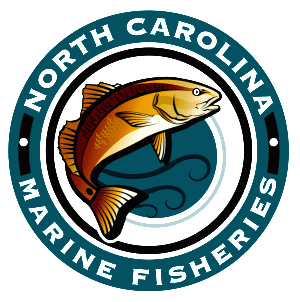 It looks like the other shoe has dropped on legislators’ promise that they were “watching” the N.C. Marine Fisheries Commission. A provision in the N.C. Senate’s version of the state budget, making its way through the General Assembly, would cut two members from the nine-person commission. A supermajority — five out of seven commissioners — would also be required for the commission to take virtually any action, including changing rules on fishing regulations. Per another provision, if the N.C. Department of Environmental Quality directs the commission to create a fisheries management plan supplement — a stop-gap measure intended to quickly protect species that may be in decline — it could not include strategies that were not a part of the original management plan or rules that “result in severe curtailment of the usefulness or value of equipment.” Read the rest here 15:39
It looks like the other shoe has dropped on legislators’ promise that they were “watching” the N.C. Marine Fisheries Commission. A provision in the N.C. Senate’s version of the state budget, making its way through the General Assembly, would cut two members from the nine-person commission. A supermajority — five out of seven commissioners — would also be required for the commission to take virtually any action, including changing rules on fishing regulations. Per another provision, if the N.C. Department of Environmental Quality directs the commission to create a fisheries management plan supplement — a stop-gap measure intended to quickly protect species that may be in decline — it could not include strategies that were not a part of the original management plan or rules that “result in severe curtailment of the usefulness or value of equipment.” Read the rest here 15:39
Catch Shares: After 10-year crab review, NPFMC seeks social impact information. Are they blind?
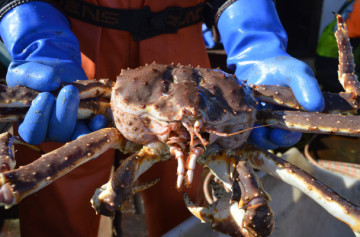 The North Pacific Fishery Management Council approved a 10-year review of rationalization on June 10, the program that ended derby-style crab fisheries in 2005 and gave quota shares to vessel owners, captains and processors. The aim was to reduce overcapitalization and create a safer fishery by allowing crew to fish slower with a guaranteed quota allocation compared to the previous free-for-all. The study – The 10-year review charted a continuation of trends found in the five-year review. Vessel consolidation continued along with quota consolidation, but both somewhat stabilized in the last five years. Fewer people hold quota than before. Each individual quota holder, naturally, holds more quota now than in 2004; 53 fewer people hold Bristol Bay red king crab crew shares now than in 2005. In the two years following rationalization, the crab fleet shrank from 256 vessels in 2004 to 91 in 2006. Read the rest here 12:49
The North Pacific Fishery Management Council approved a 10-year review of rationalization on June 10, the program that ended derby-style crab fisheries in 2005 and gave quota shares to vessel owners, captains and processors. The aim was to reduce overcapitalization and create a safer fishery by allowing crew to fish slower with a guaranteed quota allocation compared to the previous free-for-all. The study – The 10-year review charted a continuation of trends found in the five-year review. Vessel consolidation continued along with quota consolidation, but both somewhat stabilized in the last five years. Fewer people hold quota than before. Each individual quota holder, naturally, holds more quota now than in 2004; 53 fewer people hold Bristol Bay red king crab crew shares now than in 2005. In the two years following rationalization, the crab fleet shrank from 256 vessels in 2004 to 91 in 2006. Read the rest here 12:49
UPDATED: 2 lobster fishermen drown, 1 survives when boat capsized this morning near Bathurst, N.B.
 Two commercial lobster fishermen drowned early on Thursday in the Bay of Chaleur off Miller Brook Wharf, near Bathurst, N.B., when their boat capsized. The bodies of the two drowned fishermen have been recovered. A third fisherman survived and was treated at hospital and released. The drowning victims are a 45-year-old man from Bathurst and a 67-year-old man from Salmon Beach. The man who survived was a 47-year-old man from Salmon Beach. RCMP responded to a call about a capsized fishing boat at 5:15 a.m. on Thursday. Fishermen on a nearby boat retrieved the bodies of the two dead men. Link 12:18 Our hearts and prayers go out to the family, friends and loved ones of Darren Cole, 45 from Bathurst and Garnet Dickson, 67, from Salmon Beach. 15:25
Two commercial lobster fishermen drowned early on Thursday in the Bay of Chaleur off Miller Brook Wharf, near Bathurst, N.B., when their boat capsized. The bodies of the two drowned fishermen have been recovered. A third fisherman survived and was treated at hospital and released. The drowning victims are a 45-year-old man from Bathurst and a 67-year-old man from Salmon Beach. The man who survived was a 47-year-old man from Salmon Beach. RCMP responded to a call about a capsized fishing boat at 5:15 a.m. on Thursday. Fishermen on a nearby boat retrieved the bodies of the two dead men. Link 12:18 Our hearts and prayers go out to the family, friends and loved ones of Darren Cole, 45 from Bathurst and Garnet Dickson, 67, from Salmon Beach. 15:25
Deep Sea Fishermen’s Benefit Fund treasurer accused of stealing over $10,000 pleads not guilty
 The treasurer for the Deep Sea Fishermen’s Benefit Fund is accused of stealing more than $10,000 from the Warrenton nonprofit. Janelle Marie Adams, 42, of Hammond, pleaded not guilty Wednesday in Clatsop County Circuit Court to first-degree aggravated theft. The alleged theft occurred between May and November 2013. Warrenton Police Chief Mathew Workman said the investigation began in September 2014. Adams was arrested last month after a grand jury indictment. She is out of custody on a release agreement from the jail. Police continue to investigate, and believe she may have stolen more funds. “This has been an ongoing investigation for a couple of years now,” Workman said. “There is more to come on this.” Read the story here 11:20
The treasurer for the Deep Sea Fishermen’s Benefit Fund is accused of stealing more than $10,000 from the Warrenton nonprofit. Janelle Marie Adams, 42, of Hammond, pleaded not guilty Wednesday in Clatsop County Circuit Court to first-degree aggravated theft. The alleged theft occurred between May and November 2013. Warrenton Police Chief Mathew Workman said the investigation began in September 2014. Adams was arrested last month after a grand jury indictment. She is out of custody on a release agreement from the jail. Police continue to investigate, and believe she may have stolen more funds. “This has been an ongoing investigation for a couple of years now,” Workman said. “There is more to come on this.” Read the story here 11:20
The Louisiana Senate approves commercial fishing tax break
 The Louisiana Senate today approved two bills by a local lawmaker aimed at restoring sales tax exemptions for commercial fishermen and the purchase of fuels for residential use that were nixed in the confusing final moments of the year’s first special legislative session. Senate Bill 4 by Sen. Norby Chabert, R-Houma, restores a long-standing tax break for purchases of fishing vessels, supplies, fuels, lubricants and repair services by a licensed commercial fisherman in Louisiana. Chabert’s bill would also restore the commercial fishing exemptions for two cents of the state sales tax that were scrubbed of dozens of tax breaks earlier this year to raise additional revenue for the state. Both changes in Chabert’s bill would begin July 1. Read the rest here 11:05
The Louisiana Senate today approved two bills by a local lawmaker aimed at restoring sales tax exemptions for commercial fishermen and the purchase of fuels for residential use that were nixed in the confusing final moments of the year’s first special legislative session. Senate Bill 4 by Sen. Norby Chabert, R-Houma, restores a long-standing tax break for purchases of fishing vessels, supplies, fuels, lubricants and repair services by a licensed commercial fisherman in Louisiana. Chabert’s bill would also restore the commercial fishing exemptions for two cents of the state sales tax that were scrubbed of dozens of tax breaks earlier this year to raise additional revenue for the state. Both changes in Chabert’s bill would begin July 1. Read the rest here 11:05
P.E.I. lobster fishermen being polled about season extension beyond June 30th closure
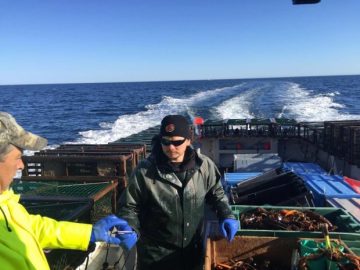 Island lobster fishermen are being asked if they want an extension of the spring season. In most parts of the Island, the season is scheduled to end on June 30th, but low catches in some areas and stormy weather have prompted a discussion around adding more fishing days into July. “It’s very preliminary at this point. We’re doing a canvas amongst our harvester organizations to see if there’s interest for us to proceed,” explained Ian MacPherson, executive director of the P.E.I. Fishermen’s Association. “It won’t be something we proceed with unless there’s quite a bit of significant support.” A spokesperson for DFO Gulf Region says the department has not received any request from P.E.I. for an extension to the spring lobster season but says there was no delay in the opening so “no circumstances which would warrant an extension of the season”. Read the rest here 09:11
Island lobster fishermen are being asked if they want an extension of the spring season. In most parts of the Island, the season is scheduled to end on June 30th, but low catches in some areas and stormy weather have prompted a discussion around adding more fishing days into July. “It’s very preliminary at this point. We’re doing a canvas amongst our harvester organizations to see if there’s interest for us to proceed,” explained Ian MacPherson, executive director of the P.E.I. Fishermen’s Association. “It won’t be something we proceed with unless there’s quite a bit of significant support.” A spokesperson for DFO Gulf Region says the department has not received any request from P.E.I. for an extension to the spring lobster season but says there was no delay in the opening so “no circumstances which would warrant an extension of the season”. Read the rest here 09:11
Boston Fish Pier’s seafood business evolving with the industry
 After years of struggle in the face of a declining local fishery, the Fish Pier in Boston is again bursting with seafood businesses. But with New England fishing stocks tightly managed, the Fish Pier dealers are now more reliant on fishermen from distant oceans, their catch arriving by truck after being shipped through Logan Airport or the Conley Terminal. Just a few years ago, Fish Pier was a little more than half full, the tail-end of a rocky period when its decline seemed inevitable. Today, it is nearly fully occupied with 15 tenants — part of a booming secondary trade of more than 60 seafood processing businesses in and near the South Boston waterfront. They’ve managed to survive because of their proximity to local highways, Logan, and the Conley Terminal, which brings in massive cargo containers from all over the world. Read the rest here 08:10
After years of struggle in the face of a declining local fishery, the Fish Pier in Boston is again bursting with seafood businesses. But with New England fishing stocks tightly managed, the Fish Pier dealers are now more reliant on fishermen from distant oceans, their catch arriving by truck after being shipped through Logan Airport or the Conley Terminal. Just a few years ago, Fish Pier was a little more than half full, the tail-end of a rocky period when its decline seemed inevitable. Today, it is nearly fully occupied with 15 tenants — part of a booming secondary trade of more than 60 seafood processing businesses in and near the South Boston waterfront. They’ve managed to survive because of their proximity to local highways, Logan, and the Conley Terminal, which brings in massive cargo containers from all over the world. Read the rest here 08:10
Bay of Fundy tidal turbines on hold over environmental concerns
 Plans for the installation of a tidal turbine on the bottom of the ocean floor in the Bay of Fundy, N.S., have been put on hold. The company, Cape Sharp Tidal and the provincial government have postponed the project. Fishermen and scientists are concerned about the impact the turbines could have on an important and diverse marine ecosystem. Lobster fisherman Colin Sproul of the Bay of Fundy Inshore Fishermen’s Association is against installing the tidal turbines. He tells The Current‘s Anna Maria Tremonti why stopping this project is important to him. “The reason for our involvement in this is to preserve our way of life and our culture. The bay has sustained us for 400 years. My family has five generations of involvement in this industry and we will not see it washed it away by corporate efficiency and greed.” Audio report, Listen, read the rest here 08:01
Plans for the installation of a tidal turbine on the bottom of the ocean floor in the Bay of Fundy, N.S., have been put on hold. The company, Cape Sharp Tidal and the provincial government have postponed the project. Fishermen and scientists are concerned about the impact the turbines could have on an important and diverse marine ecosystem. Lobster fisherman Colin Sproul of the Bay of Fundy Inshore Fishermen’s Association is against installing the tidal turbines. He tells The Current‘s Anna Maria Tremonti why stopping this project is important to him. “The reason for our involvement in this is to preserve our way of life and our culture. The bay has sustained us for 400 years. My family has five generations of involvement in this industry and we will not see it washed it away by corporate efficiency and greed.” Audio report, Listen, read the rest here 08:01
Maine: Two weeks remain for ‘fishing for the halibut’
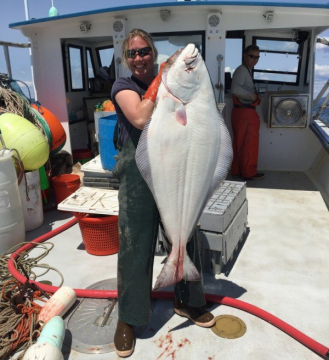 SOUTHWEST HARBOR — With a May 1 to June 30 season, Atlantic halibut can be a boon to lobstermen before the summer lobster season gets busy. Some are multitasking, checking their halibut trawls in between trips to get their lobster traps in the water. Home and restaurant cooks like the fish for its firm texture; the flesh doesn’t fall apart the way it does with haddock or other common groundfish. Halibut trawls have hooks on them, which must be circle hooks of a certain size. “We set out a trawl with about 80 hooks on it,” said Holly Masterson, sternman on Mike Carroll’s F/V Molly Hock, of a late May day when they caught a 49-pound, 50-inch halibut. Read the story here 14:04
SOUTHWEST HARBOR — With a May 1 to June 30 season, Atlantic halibut can be a boon to lobstermen before the summer lobster season gets busy. Some are multitasking, checking their halibut trawls in between trips to get their lobster traps in the water. Home and restaurant cooks like the fish for its firm texture; the flesh doesn’t fall apart the way it does with haddock or other common groundfish. Halibut trawls have hooks on them, which must be circle hooks of a certain size. “We set out a trawl with about 80 hooks on it,” said Holly Masterson, sternman on Mike Carroll’s F/V Molly Hock, of a late May day when they caught a 49-pound, 50-inch halibut. Read the story here 14:04
North Carolina Fisheries Association Weekly Update for June 13, 2016
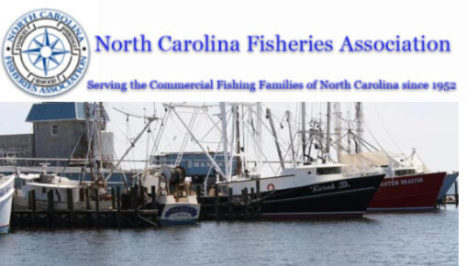 Click here to read the Weekly Update, to read all the updates, Click here 13:54
Click here to read the Weekly Update, to read all the updates, Click here 13:54
Athearn Marine Agency Boat of the Week: 42′ Wood Lobster boat, 250HP, 8 Cylinder Detroit 871
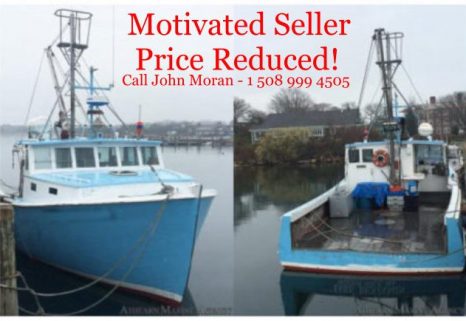 Specifications, information and 13 photos click here To see all the boats in this series, Click here 12:39
Specifications, information and 13 photos click here To see all the boats in this series, Click here 12:39
N.S. fishing companies fight to keep Last In First Out shrimp policy
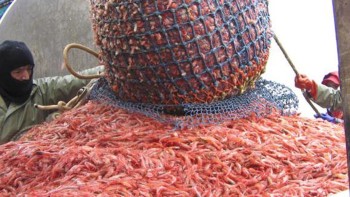 Members of Nova Scotia’s offshore shrimp fishery are launching a last ditch effort to sway federal politicians to keep the long-standing Last In First Out policy after what they’re describing as an unfair consultation process. On Friday, industry stakeholders met in Halifax to make their case to a federally-appointed panel tasked with reviewing the Last In First Out (LIFO) policy, but some feel their concerns fell on deaf ears. Scott Nichols, CEO of North Sydney shrimp harvester M. V. Osprey Ltd. — one of four Nova Scotia companies that fish eight of the 17 offshore licences — said he felt Friday’s consultation was pointless. In recent years stock declines in that area have caused major quota cuts, which due to LIFO has affected mainly the inshore fishery, leading stakeholders in Newfoundland and Labrador to call for an end to the policy. Read the story here 10:46
Members of Nova Scotia’s offshore shrimp fishery are launching a last ditch effort to sway federal politicians to keep the long-standing Last In First Out policy after what they’re describing as an unfair consultation process. On Friday, industry stakeholders met in Halifax to make their case to a federally-appointed panel tasked with reviewing the Last In First Out (LIFO) policy, but some feel their concerns fell on deaf ears. Scott Nichols, CEO of North Sydney shrimp harvester M. V. Osprey Ltd. — one of four Nova Scotia companies that fish eight of the 17 offshore licences — said he felt Friday’s consultation was pointless. In recent years stock declines in that area have caused major quota cuts, which due to LIFO has affected mainly the inshore fishery, leading stakeholders in Newfoundland and Labrador to call for an end to the policy. Read the story here 10:46






